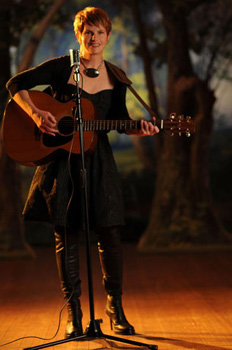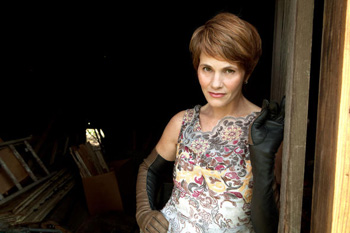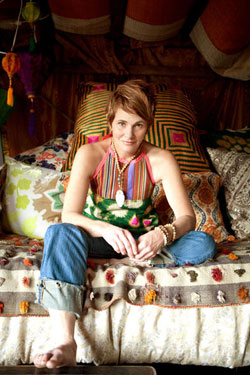“I’m sorry but I’ve got to go here in a minute…I’ve got to go sit in with Loudon Wainwright.”
Shawn Colvin: Our Interview and Phoenix MIM Show Review
By Mariah Fleming
Shawn Colvin truly is a one of a kind talent. Her brilliant, captivating songwriting is technically marvelous, deeply personal, and infused with self-effacing wit, heartbreak and suffer-no-fools savvy. I was honored to talk to her prior to her recent Phoenix appearance. I told her that, for me, there has been no other female ‘confessional’ songwriter since Joni Mitchell, who speaks to women like she does. She seemed taken aback. “Thank you! That’s a great compliment!” she told me. Bright, kind and accommodating, the person she shows us through her work is authentic. Down to earth, funny, whip-smart, stripped of naiveté, but still full of heart. That’s Shawn Colvin.
I told her that, for me, there has been no other female ‘confessional’ songwriter since Joni Mitchell, who speaks to women like she does. She seemed taken aback. “Thank you! That’s a great compliment!” she told me. Bright, kind and accommodating, the person she shows us through her work is authentic. Down to earth, funny, whip-smart, stripped of naiveté, but still full of heart. That’s Shawn Colvin.
Phoenix was the last show on her tour and Colvin said it seemed like the perfect place to end her tour. A couple of weeks ago, she played two sold out shows at the Musical Instrument Museum. Completely engaging the audience for almost two hours, Colvin captured their imagination and left them wanting more after seventeen songs. The songs she chose covered her entire career and then some. Her surprise opening of “Catch the Wind” by Donovan was gorgeous. She performed three songs from her album These Four Walls, the title song, plus “Fill Me Up” and “Summer Dress.”
From her final 2008 record for Columbia, Sunny Came Home, she sang her hit song of the same name, and went on to sing “Wichita Skyline.” From Fat City she did “Round of Blues,” and one of my all time favorites, “Shotgun Down the Avalanche” from Steady On. From her critically acclaimed new album All Fall Down, her first release since she decided to sign with Nonesuch Records, she belted out the never-give-up, life affirming title song “All Fall Down.” She mesmerized the audience with the haunting “Seven Times the Charm,” the plaintive “I Don’t Know You” and her wonderful collaboration with Patti Griffin, “New Change is On the Way.”
Colvin left the stage to a rousing encore, and returned to sing four more songs. She chose to sing four covers with a passion that made them her own. Her version of the heartrending “Killin the Blues,” written in 1990 by Rowland Salley, was spectacular. Masterfully covered by everyone from John Prine to Chris Smither, Colvin’s version keeps them in good company. She did a beautiful version of Jimmy Webb’s “If These Walls Could Speak,” and the Gnarls Barkley penned “Crazy”, Tom Waits’ “Hold On,” and ended the show with “That’s the Way Love Goes” by Buddy and Julie Miller.
Over the past two decades, Shawn Colvin has released eight CDs, won three Grammy Awards, decided to change record labels and written an autobiography about her career and her struggles with depression and mental illness. Her tour in support of her newest CD release “All Fall Down,” is bringing her fans out in droves. Originally booked for one night at the MIM, another show was added due to the overwhelming response. Colvin fans have waited a long time for her new release and it has been well worth the wait.
Before I talked with Shawn Colvin, I’d been wondering why it had been so long since she released a new CD. Her new autobiography, and our conversation, revealed some clues. Reading her book and talking to her revealed the rare depth, humility and wit she possesses about herself, her career and her life. She didn’t mention her book “Diamond in the Rough” at the concert, nor did she push her new CD. She just seemed to enjoy playing for the audience.
Her newest CD All Fall Down speaks for itself. All Fall Down continues to get tremendous critical and audience response. Her fans connect to her music in a profound way. Prior to our conversation, I’d read Colvin’s highly entertaining book about the roller coaster thrills and chills of her life in the music business. Upon reading her book it was clear that she’s not only an unusually gifted songwriter, but also a fascinating and uncompromising person. Her book, like her music, is astonishingly self revelatory. It is also very witty. Here’s what she had to say to me:
Q. I’ve been listening to you since you first started recording. You were the first woman singer/songwriter whose work spoke to me as powerfully as Joni Mitchell’s. For me, as a confessional singer/songwriter, you are second only to Joni Mitchell.
A. Thank you! That’s a big compliment.
Q. The music business has undergone so many changes since you began your career. Do you have any advice for today’s young songwriters?
A. You can’t look at the music business as different. You just have to do the work you love. Everything else is mercurial. You can’t predict the trends in music. You can connect with someone and then they’re gone. They’re on to something else. And there you are, back to just you again.
You just have to do the work you love. Everything else is mercurial. You can’t predict the trends in music. You can connect with someone and then they’re gone. They’re on to something else. And there you are, back to just you again.
Q. So, what’s your biggest challenge as a songwriter?
A. Just to keep on writing!
Q. You’ve collaborated with a lot of people including James Taylor, Bela Fleck, Allison Krause, Emmy Lou Harris, Patti Griffin, Jakob Dylan, Teddy Thompson, Robby Roberson and Buddy Miller. Do you prefer to write alone or collaborate on your songs?
A. I like to do both. It’s a process. It may come out of the blue, and you just get lucky if it gets handed to you. When I collaborate it happens in various ways. Someone might have a title or someone has a melody. But once the collaboration has started, I need room to take a day or so by myself and work on it. Figuring it out, experimenting with the whole story.
Q. Do the lyrics or melody come first?
A. It depends. But rarely do the words come first and the music later.
Q.In your new autobiography “Diamond in the Rough” you talked about being asked for advice from aspiring songwriters. You mentioned one friend who gave you lyrics to critique that included the rhyme “Apocalypse” with “Picasso Lips” and you weren’t sure how to tell them it wasn’t good. Do people ask you to look at their lyrics now?
A. No, I don’t get a lot of people asking me to critique music anymore, really. (chuckles)
Q. Your book mentions Richard Thompson and what a big influence he is on your music. When did you first become aware of his music?
A. I toured with Richard in 1991. It was a dream come true! I knew his music well before then. I knew Richard and Linda’s work, but not much Fairport Convention. The first one I remember is “I Want to See the Bright Lights Tonight.”
Q. You and RT share some commonality in terms of writing. You both write deep lyrics and you both are very witty. How does your wit help you to survive?
A. I don’t see how anyone survives without it! Everyone needs balance and humor. Levity. There’s stuff we all have to deal with. And you need balance to deal with it.
Q. Do you mind if we talk about your daughter Caledonia? She’s about 12, right?
A. She’s fourteen! And no, I don’t mind.
Q. Does she come on tour with you?
A. She used to come but she doesn’t anymore. She’d rather stay at home with her friends.
Q. Does she like your music?
A. She knows it but she likes what is popular.
Q. Have your parents been able to enjoy your success? And were they supportive of your decision to pursue a music career?
A. Yes they have been. We came from a small town and a career in music was just out of our depth. I went to college briefly but it was obvious that I wanted to do this.
Q. If your daughter wanted to be in the music business would you be supportive of that decision?
A. (Laughs) Well, she’s into a lot of things! She’s on the swim team. She writes, she’s in theatre. She plays the ukulele. The ukulele is the popular thing now.
Q. She sounds like a chip off the old block.
A. Yes, well, I think they all are to some extent.
Q. You moved from Columbia to Nonesuch in 2008. What prompted that change?
A. I didn’t feel I could do the music I wanted to do at Columbia. When you have a hit record (A Few Small Repairs) you tend to set yourself up. Not in a bad way, but that becomes the expectation, not what I want it to be. They didn’t seem interested in what I was doing and it didn’t feel good. So I wanted to go in a new direction where I could write what I want to write. I didn’t feel I could do much I wanted to do at Columbia after I did A Few Small Repairs.
Q. Was your book difficult to write? It’s so self revelatory.
A. It wasn’t hard to write a book, I just didn’t really know how. I’ve talked about the things in the book a lot, with a lot of different people. So it was not unfamiliar territory.
Q.On the Tavis Smiley show on PBS in June 2012 you said: “In the mental illness department I got my share.” I was really moved by your interview. It seems to me that mental illness can be a rational reaction to today’s world.
A. Yes, there’s such a stigma to depression and so many people don’t deal with it.
Q.“Diamond in the Rough” is a book I couldn’t put down. You talk about the events that inspired different songs. I’ve had songwriters tell me they don’t like it when people try to figure out what their songs mean. It was validating to read that someone so creative and successful has gone through depression and is willing to talk about it.
A. It needs to be talked about.
Q.Well, thank you for talking about it. Your book is entertaining and inspiring, like your music. It’s been wonderful talking to you.
A. Thank you. I’m sorry but I’ve got to go here in a minute…I’ve got to go sit in with Loudon Wainwright.
Q.Well, thanks again, Shawn. And have fun!